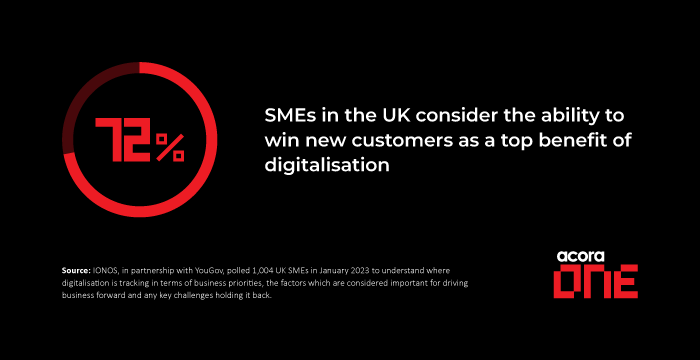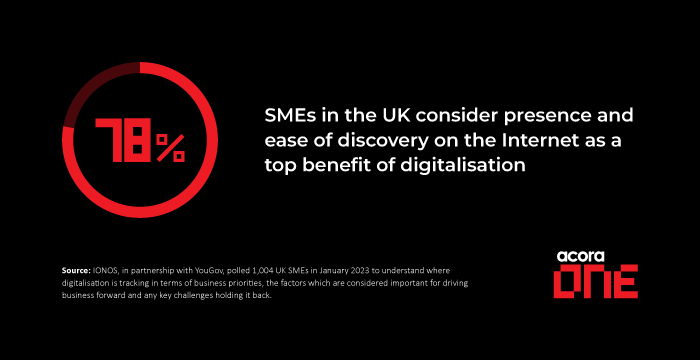IT Support for Small Business

In today's digital landscape, the importance of IT support for small businesses can't be overstated.
Just like a reliable compass guiding a ship through uncharted waters, IT support serves as the guiding force that enables a small business to navigate the ever-evolving world of technology.
From establishing a robust technology infrastructure to ensuring seamless operations, IT support is the lifeline that keeps small businesses afloat in a sea of digital challenges.
In this article, we will explore the critical role of IT support for small businesses, highlighting its significance and the key advantages it brings.
So, fasten your seatbelts as we embark on a journey to unravel the power of IT support to help deliver on your business goals and strategy.
Contents
- What is IT and why is it important in business?
- Why does a business need an IT support service?
- What does IT support include?
- What is the difference between IT service and IT support?
- In-house IT Support vs Outsourced IT Support
- What to look for in an IT support company?
- Why are IT experts important in business?
- What are the top 5 benefits of IT in business?
- Final Thoughts
What is IT and why is it important in business?
At its core, IT, or Information Technology, encompasses the systems, software, networks, and processes that businesses use to store, retrieve, transmit, and protect their data.
It is the backbone of modern business operations, enabling:
- Efficient communication
- Streamlined processes
- Enhanced productivity
In today's interconnected world, IT has become a fundamental aspect of running a successful company.
Why does a business need an IT support service?
For a small company, the business need for a dedicated IT support service is paramount.
Here are some key reasons why your business cannot afford to overlook the importance of a fully managed IT support:
Reliable technology infrastructure
A first-class technology infrastructure is the foundation on which small businesses build their digital presence.
IT support ensures that your company has the necessary equipment and network infrastructure in place to support day-to-day operations.
With a reliable technology backbone, you can focus on their core competencies without worrying about system failures or data breaches to help save time.
Expertise and guidance
Technology is a rapidly evolving landscape, and keeping up with the latest trends and updates can be overwhelming for SME owners.
Outsourced small business IT support provides access to highly skilled professionals who possess the expertise and skills to navigate the ever-changing technology landscape.
Their guidance helps you to:
- Make informed decisions
- Implement best practices
- Leverage new technologies
All to gain a competitive edge.
Proactive problem-solving
Small business IT support goes beyond reactive troubleshooting.
It involves proactive monitoring, maintenance, and preventive measures to identify and address potential issues before they disrupt business operations.
With a dedicated IT support service, you can:
- Mitigate risks
- Minimise downtime
- Ensure seamless productivity
- Future proof your organisation
Getting left behind
Research from IONOS found that 79% of SMEs in the UK consider digitalisation to be important for the future viability of their business, with the three top benefits including presence and ease of discovery on the internet (78%), creating a modern image (76%) and the ability to win new customers (72%).
This shows digitalisation is increasingly crucial for future growth.
By utilising IT support, you can stay ahead of the curve.

What does IT support include?
Small business IT support encompasses a wide range of professional services tailored to address the immediate technical needs of small businesses.
Here are some examples of specific professional services offered by providers:
Personalised solutions
An IT support provider understands that each small business has unique requirements.
They assist with personalised solutions that align with the business' goals and objectives.
This ensures that technology serves as an enabler rather than a roadblock.
Hardware & software management
This encompasses the management of these assets, including:
- Procurement
- Installation
- Configuration
- Updates
This ensures that you have the right tools and technologies to operate efficiently.
For hardware, consider your:
- PCs/laptops
- Routers
- Switches
- Servers
- Phone systems
- Cabling
For software, you could think of:
Proactive maintenance
IT support providers implement proactive maintenance measures to keep IT systems running smoothly.
Regular system health checks, patches, and performance optimisation are part of their proactive approach, minimising the risk of downtime and maximising productivity.
Network monitoring & management
IT support includes the monitoring and management of networks to ensure optimal performance, security, and availability.
This involves:
- Proactive monitoring of network infrastructure
- Troubleshooting connectivity issues
- Implementing cyber security measures.
Software updates & patches
Providers keep systems up to date (including anti-virus) by applying necessary updates, security patches, and bug fixes for their clients.
This ensures that your company can benefit from the latest features, improved performance, and enhanced cyber security.
Data backup & disaster recovery
IT support includes robust data backup and disaster recovery solutions.
By implementing regular backups and devising comprehensive recovery strategies, your provider can ensure that you can quickly recover from huge amounts of data loss or system failures.
What else is included?
- On site/remote support
- SLAs (Service Level Agreements)
- Self-service portal
- Dedicated account manager
- Global discounts and more.

What is the difference between IT service and IT support?
While IT services and IT support are related, they have distinct focuses.
An IT service encompass a broader scope, including the planning, implementation, and management of technology solutions to meet specific company objectives.
On the other hand, IT support primarily revolves around addressing immediate technical issues and providing ongoing assistance to end-users.
It ensures that your company can have a reliable technical point of call when problems arise, minimising disruptions and ensuring smooth operations.
In-house IT Support vs Outsourced IT Support
Let's take a look at your IT support options.
In-house IT support refers to an internal specialist IT department for your business.
Any internal IT issues would be the responsibility of the whole IT team.
If your company has less than than 150 staff members, it's more than likely that hiring a full internal IT team will be an unnecessary expense.
Outsourcing, or fully managed, is a better option.
Let’s compare in-house IT support and outsourcing:
Pros of In-house IT Support services
- Build an IT team with highly specialist skills to align with your systems and business objectives
- Answer and resolve many issues or technical problems very quickly
- Understands your people, your users, your customers, and your prospects
Cons of In-house IT Support
- Cost. Recruiting, salaries, continued professional development, providing support and equipment to team members is expensive
- Covering long hours with a small team as systems need to be fixed, no matter the time of day
- Holidays, absences and sickness
- Gaps in skills and resource
- Staff turnover
Cons of Outsourcing IT Support
- Potential lack of communication
- Loss of control
- Potential lack of internal familiarity
- Potential longer response times
Pros of Outsourcing an IT Support service
- Very cost-effective
- Highly experienced
- No worry about holidays, absences and sickness
- Service Level Agreements (SLAs)
- Proactive monitoring and reporting
- Specialist team of skills
What to look for in an IT support company?
When outsourcing to an IT support provider, there are several factors you should take into consideration:
Responsiveness
Ensure that the IT support company manage a responsive service for their existing clients, with a support team that can address your business's needs promptly.
Quick response times can minimise downtime and keep your company operations running smoothly.
Expertise
Look for an IT support provider with experience in supporting small business clients, preferably in your industry, with a strong team.
Their experience will ensure they understand your unique requirements and provide a tailored solution and service.
Tailored support packages
Evaluate the packages offered by IT support companies and ensure they align with your business' specific IT needs.
Flexible packages allow you to scale your support service as your company grows and evolves. Look out for those that provide a personal service that can include on-site support, when necessary.
Cost-effectiveness
Consider the cost of IT support services in relation to the value they provide.
It's important to strike a balance between the two to ensure you are getting the best service and return on your investment.
Do they actually deliver on what they say?

Why are IT experts important in business?
IT experts play a crucial role in helping small businesses effectively manage their technology.
Here's why they are indispensable:
Knowledge & expertise
IT experts possess specialised knowledge and experience in managing IT systems.
They keep up-to-date with the latest trends, security practices, and industry standards, ensuring that small businesses can stay ahead of the curve.
Problem-solving abilities
IT experts are skilled problem solvers who can quickly identify and resolve technical issues.
Their ability to troubleshoot and find an innovative solution minimises downtime and keeps businesses operating smoothly.
Contribution to business growth
IT experts understand the strategic role technology plays in driving company growth.
They can deliver technology solutions that meet your company goals, suggesting ways to optimise processes, enhance efficiency, improve your service and seize opportunities for expansion.
What are the top 5 benefits of IT in business?
Investing in IT support offers small businesses a multitude of benefits.
Here are the top 5 advantages:
#1 Cost Effectiveness
Effective small business IT support helps reduce costs by optimising processes, minimising downtime, and eliminating unnecessary expenses associated with system failures or inefficient operations.
#2 Improved efficiency
An IT support team streamlines workflows, automates repetitive tasks, and enhances collaboration, to save time and money.
Ultimately, improving productivity and operational efficiency.
#3 Security
With the increase in cyber threats, IT support ensures that small businesses have robust data protection measures in place, safeguarding sensitive information from unauthorised access and potential breaches.
#4 Access to the latest technologies
IT support providers keep small businesses aware of emerging technologies that can expand their organisation.
Access to new software, cloud solutions, and hardware upgrades enables small businesses to remain competitive.
#5 Business scalability
IT support can manage scalable solutions that adapt to the evolving needs of most small businesses.
It provides the flexibility to grow and expand without being limited by technological constraints.

Final Thoughts
IT support is not merely a luxury for small businesses:
It is a necessity for your overall business strategy.
By ensuring reliable technology infrastructure, providing expert guidance, and offering proactive maintenance and support, IT support services empower small businesses to thrive in the digital era.
A reminder of some of the advantages below:
- Cost effective (Save money)
- Improve efficiencies (Save time)
- Security
- Access to the latest technologies
- Scalability, to name a few
As small businesses navigate the complex technological landscape, embracing IT support solutions becomes paramount for you achieving your business goals.
So, seize the opportunity to harness the power of IT support and scale your small business to new heights of success.
We really hope you enjoyed our article on IT support for small business.
Now we'd like to hear from you:
Do you have any further questions about this topic?
Perhaps you are considering IT support for your business?
Either way, let us know your thoughts.
Back to the blog.





